ONDCP Blog
10 Reasons to Get Covered, Ten Days left to Enroll
Posted by on March 21, 2014 at 12:57 PM ESTAs of today, there are only 10 days left to enroll in health coverage at healthcare.gov before open enrollment ends on March 31.
If you haven’t enrolled yet, go to healthcare.gov today to sign up. For most people, the entire application process takes only 15 – 20 minutes.
For those of us in recovery—and for anyone who loves someone in recovery—health coverage now carries an incredibly important benefit: substance use disorder treatment is covered like any other medical service. The Affordable Care Act ends discriminatory practices that used to limit insurance coverage for behavioral health treatment and services, expanding these services to 62 million Americans.
Are you covered yet? If not, head over to healthcare.gov apply now.
We know that substance use disorders are treatable—and recovery is possible. But too many Americans have not been able to get treatment because they didn’t have insurance coverage. According to the 2012 National Survey on Drug Use and Health, about 23 million Americans were in need of treatment for a substance use disorder, and only 2.5 million—about 1-in-10—actually received it.
That’s why we need your help to make sure your friends, family, and loved ones are covered and have access to health care.
With just one application, you can also find out whether you qualify for tax credits to help pay for insurance or other free or low-cost coverage options.
You can compare your options based on price, benefits, quality and other features, and enroll in a plan that fits your needs and your budget.
To mark the 10 final days of open enrollment, here are 10 reasons to get covered. Check them out, then head over to healthcare.gov.
10 reasons to get covered:
- Mental health and substance abuse disorder services must be covered at parity with medical benefits.
- Six in ten uninsured Americans can get coverage for less than $100 a month.
- Preventive services like well-woman visits, cancer screenings, flu shots and more cost you nothing out of pocket.
- It's illegal for insurance companies to charge more or deny coverage due to a pre-existing condition or cancel your coverage when you get sick.
- All plans must cover essential health benefits including outpatient care, hospital visits, prescriptions, and more.
- Because accidents happen, and no one is invincible.
- Insurance companies can no longer impose yearly limits on coverage for essential health benefits.
- No one deserves to go broke just because they get sick.
- Because you only live once.
- You can apply for coverage online at healthcare.gov. on the phone by calling 1-800-318-2596, in person (find local help here) or by mail (download the application to mail in here) -- the whole process takes most people about 15 to 20 minutes
Learn more aboutSpringtime: A Good Time to Think About our Kids and Steroids
Posted by on March 18, 2014 at 2:27 PM ESTNow that the ice is melting and sporting activities are getting underway across the country, it is just a matter of time before a high-profile athlete tests positive for appearance and performance enhancing drugs (APEDs). The media will be catapulted into a fever pitch as disappointed fans become embarrassed for their favorite teams and players. But, as tragic as those events will be, they pale in comparison to the daily occurrence of this drug use by America’s youth.
My son, Taylor, died after using anabolic steroids. A high school baseball player, Taylor was a 6’2”, 180-pound 16-year-old made the decision to use drugs after he was told that he needed to “get bigger” to make the varsity team. The peer pressure to resort to drugs made Taylor’s decision a relatively easy one.

Photo: Don Hooton and Taylor Hooton
As parents, we were surprised to learn that APEDs can be very dangerous and shocked to learn how many kids are using them. We formed the non-profit Taylor Hooton Foundation to address this issue, raise awareness about how widespread this drug use is, and to educate people about how dangerous steroids and other APEDs can be. We are now widely recognized as America’s leader on this topic.
The most recent study[i] focused on youth steroid use, performed at the University of Minnesota, was published 14 months ago. The study of over 2,700 adolescents found that “the use of muscle-enhancing behaviors is higher than has been previously reported and is cause for concern.” Almost 6 percent (5.9 percent) of boys and 4.4 percent of girls in the middle and high school study admitted to ever using anabolic steroids.
On the heels of the Minnesota study, we helped underwrite a national study to determine the knowledge level of the U.S. adult population about this problem. This 2013 University of Massachusetts-designed household survey[ii] told us that adults are virtually oblivious to the fact that this problem even exists. Only 17 percent of American adults see steroid use as a big problem among high school athletes.

Photo: Hooton Foundation's Chalk Talk to 1,300 high school boys (Jan. 2014)
Frankly, I’m not surprised that adults are so unaware. Our kids keep this behavior secret and deny their usage, just as their role models do. While we focus nonstop attention on this subject whenever an elite athlete is accused of doping, few have focused on a more serious component of this behavior: the fact that so many of our children are using these drugs.
Our mission is to educate America’s youth about the dangers of APEDs and to equip adult leaders to engage. We’ve delivered education programs to almost 700,000 people. We now offer eLearning programs that will enable us to reach millions more.

Photo: Don Hooton delivers an in-stadium program.
To learn more about our education programs, please watch this video and invite us to your school.
Don serves as President of the Taylor Hooton Foundation and sits on the Foundation’s Board of Directors. He and his family founded the Taylor Hooton Foundation in 2004, the year following the loss of their son Taylor.
Learn more aboutU.S and Sweden Host Discussions on Drug Policy Reforms under the Existing UN Conventions
Posted by on March 14, 2014 at 5:13 PM ESTDuring the U.N. Commission on Narcotic Drugs High Level Segment the Governments of the United States and Sweden met with countries seeking to preserve the existing three UN Drug Control Conventions and to promote public health approaches to drug policy. The ad hoc meeting was chaired by Michael Botticelli, U.S. Acting Director of National Drug Control Policy, and Maria Larsson, Swedish Minister of Health for Children and the Elderly. Participating countries were Italy, United Kingdom, France, Australia, New Zealand, and Canada.
Acting Director Botticelli reiterated United States opposition to both drug legalization and a law enforcement-only, "war on drugs" approach. He explained the U.S. is promoting, both at home and abroad, increased public health and justice sector collaboration to support the prevention and treatment of substance use disorders and save lives.
Minister Larsson expressed Sweden’s strong support for balanced policies under the three UN Conventions. She also called on governments to provide information to the public and local officials on the serious health and cognitive consequences of the use of marijuana and other drugs.
The participants also heard a brief presentation by the Director of the U.S. National Institute on Drug Abuse (NIDA) on research and science on the disease of addiction that guides U.S. national drug control policy. Dr. Volkow, who co-chaired the Scientific Consultation meeting organized by the UNODC, discussed the huge advances in neuroscience, which demonstrate that addiction is a brain disease that, like other diseases, can be addressed through evidence-based treatment, including appropriate medications.
The group agreed to exchange information and to continue to meet on the margins of future international meetings to discuss how to support the Conventions, disseminate science-based information on drug use, and identify interventions that combine the capabilities of the health and justice sectors.
Learn more aboutActing Director Botticelli Co-Leads U.S. Delegation to Austria
Posted by on March 12, 2014 at 10:27 AM EST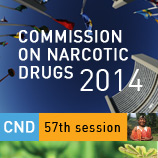 Acting Director Michael Botticelli is in Vienna, Austria, to serve as co-head of the United States delegation for the 57th Commission on Narcotic Drugs (CND), the 53-member governing body for the UN Office on Drugs and Crime. The CND is the central policy-making body within the UN dealing with drug matters.
Acting Director Michael Botticelli is in Vienna, Austria, to serve as co-head of the United States delegation for the 57th Commission on Narcotic Drugs (CND), the 53-member governing body for the UN Office on Drugs and Crime. The CND is the central policy-making body within the UN dealing with drug matters.Mr. Botticelli, along with Department of State Assistant Secretary William Brownfield, will attend the High-Level Review of the 2009 Political Declaration and Plan of Action which focuses on the reduction of both supply of and demand for drugs, together with financial and judicial aspects crucial to addressing this issue. At the conclusion of the High-Level Review, a joint ministerial statement will be issued.
Acting Director Botticelli and Assistant Secretary Brownfield are joined by representatives from across the globe, including Queen Silvia of Sweden, UN Deputy Secretary General, Jan Eliasson, the Executive Director of UNAIDS, Michel Sidibe, and many others.
In addition to participating in this high-level review and bilateral meetings, Mr. Botticelli will host a multilateral discussion on law enforcement and public health collaborations, give remarks at a US-hosted event promoting “smart on crime” policies, and raise awareness about the opioid abuse epidemic in America.
The Obama Administration is committed to restoring balance to drug policy through a comprehensive, evidence-based public health approach that reduces illicit drug use and its consequences.
Learn more about our record of drug policy reform. Join the CND conversation on Twitter using #CND2014.
Learn more aboutIntroducing the 2014 Advocates for Action
Posted by on March 7, 2014 at 5:50 PM ESTAcross America, individuals are doing extraordinary things to improve the health and safety of their communities. Whether it is developing groundbreaking programs to break the cycle of drug use and crime, conducting innovative research that expands our understanding of how drugs affect the human body, expanding treatment opportunities, or preventing drug use before it starts, the 2014 ONDCP Advocates for Action are making a difference by reducing drug use and its consequences.
Ed Jurith

Honoring our distinguished colleague.
This year, we remember and celebrate the contributions of our colleague, Edward Jurith, who passed away in November 2013. During his distinguished career at ONDCP, Mr. Jurith was appointed twice to serve as Acting Director—first by President Clinton in 2001, then by President Obama in 2009. Since 1994, he also served as ONDCP’s General Counsel, Senior Counsel and Director of Legislative Affairs. Ed also served as the United States Representative and Working Committee Chair for the Education Committee for the World Anti-Doping Agency, an international independent agency composed of sport and government leaders focused on promoting science and research-based guidance to establish a doping-free sporting environment. Ed’s reputation as a leader in drug policy crossed international borders. In 1997, he served as an Atlantic Fellow in Public Policy at the University of Manchester in the United Kingdom, where he researched and lectured on drug policy issues. As part of the Atlantic Fellowship, Ed assisted the UK Anti-Drugs Coordinator in developing the Blair Government’s strategy for reducing substance use. He lectured widely on drug policy at U.S. and British universities and authored numerous publications on substance abuse and drug policy. Outside of his official duties, Ed also served on the Advisory Committee of the American Bar Association Standing Committee on Substance Abuse, as well as the District of Columbia Bar Lawyer Assistance Program, a program providing assistance to law students, lawyers, and judges with substance use and/or mental health disorders. Ed will be remembered fondly by the many colleagues and friends whose lives he touched during his exemplary public service career.
Judge Arthur L. Burnett, Sr.

Promoting mentorships and preventing youth alcohol and substance to help young people build healthy, productive lives.
Retired Judge Arthur L. Burnett, Sr. is being honored as an Advocate for Action for his role in beginning the National African American Drug Policy Coalition (NAADPC) program for youth drug prevention. Judge Burnett designed and implemented a program through which African American professionals visit schools and talk to young people about the harmful effects of drug use on individual health and academic success. Under his leadership, the NAADPC works 7 days a week to prevent youth drug and alcohol abuse across the country. NAADPC provides tutors, counselors, and mentors from a coalition of African American professionals numbering over 1,000,000 men and women. Judge Burnett personally appears in schools across the country to provide inspirational talks about avoiding youth alcohol and drug use. His talks emphasize the value of good citizenship and the potential for individuals from humble backgrounds to become part of the American dream. In the course of his work, Judge Burnett also provides expert advice on drug and juvenile delinquency judicial issues to members of the U.S. House of Representatives and Senate.
Dr. Joan Standora
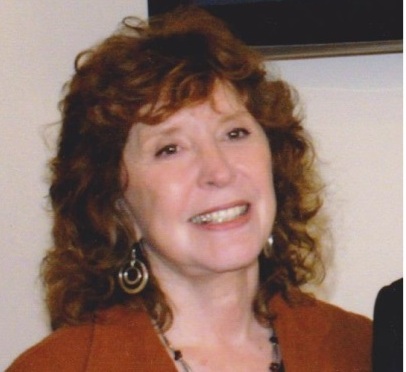
Improving clinical, administrative and educational practices in the field of substance use disorders.
For 40 years, Joan Standora, Ph.D. has worked tirelessly to improve clinical, administrative, and educational practices in the substance use disorder field. Early in her career, Dr. Standora developed an expressive therapy program in a methadone-maintenance residential program and received a NIDA grant for a program serving mothers with substance use disorders and their children. In 1998, she became the first clinical director of New York City’s Manhattan Treatment Court. Dr. Standora established protocols and policies, supervised staff, and conducted outreach to providers for the drug court participants. Dr. Standora was instrumental in establishing the New York City Regional Drug Court/Treatment Consortium. Dr. Standora then became the Executive Clinical Director at a Bronx-based treatment program, instituting staff trainings focusing on substance use disorders among clients from low-income minority communities plagued by poor health care and unemployment. In 2000, Dr. Standora developed and implemented a substance abuse counselor education program at the City University of New York’s Kingsborough Community College. The program became a degree program in 2003, approved by both New York State’s Education Department and the Office of Alcoholism and Substance Abuse Services (OASAS). In 2010, Dr. Standora received a grant from the Department of Labor (DOL) through OASAS to retrain 25 unemployed workers as substance abuse counselors, a part of the Administration’s American Recovery and Reinvestment Act of 2009. In 2013, Dr. Standora received a grant to enroll persons over the age of 50 as a community college workforce education project for professionals in the substance use disorder field. She currently directs the degree program in chemical dependency counseling at the City University of New York
Scott Strode
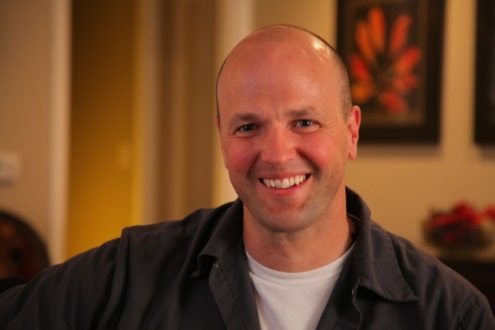
Helping individuals with substance use disorders find and maintain their recovery through sport.
Scott Strode has dedicated his life to helping individuals with substance use disorders find and maintain their recovery through sport, a dedication that has earned the attention national media organizations, to include his recognition as a CNN Hero. Scott founded Phoenix Multisport in 2007 to foster a safe, supportive, physically active community for individuals recovering from alcohol and substance use disorders and for those who choose to live a sober life. Through pursuits such as climbing, hiking, running, strength training, yoga, road/mountain biking, CrossFit, and other activities, Phoenix seeks to help its members develop and maintain the emotional strength they need to stay sober. All activities are free. The only requirement is that individuals have at least 48 hours of continued sobriety to participate. They also must adhere to Phoenix Multisport’s code of conduct, which says that anything that is not nurturing is not welcome. Since 2007, over 11,000 individuals have attended Phoenix Multisport events in Colorado, where they find a safe, sober community of friends to support them in their recovery. Scott is devoted to changing how the world views those with substance use disorders. Scott and the staff at Phoenix Multisport welcome newly-recovering individuals to join them for a free activity or workout. It is Scott’s hope that Phoenix Multisport will expand to other areas of the country to reach even more of those in need.
Melody Heaps and Pamela Rodriguez

Advancing system-wide justice interventions for people with substance use disorders.
Melody Heaps and Pamela Rodriguez are partners and leaders in advancing system-wide justice interventions for people with substance use disorders. For more than 30 years, they have shared a collective commitment to collaborative solutions that improve both public health and public safety.
Melody founded TASC in Chicago in 1976 as a nonprofit agency focused on alternatives to incarceration. She would go on to lead TASC to become a nationally recognized agency before retiring from her role as president and CEO in 2009. She remains president emeritus to TASC and is an advisor to TASC’s Center for Health and Justice, which offers public policy and consulting services nationally and internationally.
Melody began her career during the civil rights movement and served on Martin Luther King, Jr.’s staff during the Chicago campaign. From these roots grew a lifelong professional commitment to addressing the complex and interrelated issues of drugs, poverty, and crime. Under her leadership, TASC matured from a small pilot project in Cook County, Illinois to a statewide organization providing direct services for 25,000 individuals annually.
Pamela Rodriguez has served as TASC’s president and CEO since 2009, having previously directed every aspect of the agency’s operations. Under her leadership, TASC has continued to grow and thrive, including an expanded focus on diversion programs early in the justice continuum to reduce recidivism and the collateral consequences of justice involvement.
An expert in connecting research to clinical practice, Pam was appointed in 2007 to serve as a practitioner model of the Federal Coordinating Council on Juvenile Justice and Delinquency Prevention. She is active in numerous bodies to increase alternatives to incarceration, improve juvenile justice, and decrease the disproportionate incarceration of people of color.
Together, Melody and Pam have played significant roles at local, state, and national levels in the development and expansion of community-based diversion programs and treatment alternatives to incarceration to create healthier and safer communities.
Judge Robert Russell

Pioneering the veterans treatment court movement.
In January of 2008, Judge Robert Russell created and began presiding over the first “Veterans Treatment Court” in the United States. The Veterans Treatment Court is a hybrid Drug Court/Mental Health Court model for justice-involved veterans that features regular court appearances (a bi-weekly minimum in the early phases of the program), mandatory attendance at treatment sessions, and frequent and random testing for substance use (drug and/or alcohol). The Veterans Treatment Court acts as a “one-stop shop” at the courthouse, with a team of Federal, state, and local veterans’ agencies and organizations working together to link veterans with the programs, benefits, and services they have earned. For his dedication and perseverance in helping this country’s veterans, The National Vietnam Veterans of America has awarded Judge Russell with the Vietnam Veterans of America Achievement Medal and The National Veterans of Foreign Wars of the United States has awarded Judge Russell with the James E. Dan Zandt Citizenship Award.
Judge Russell has been a pioneer in the drug treatment court movement and remains a strong leader to this day. In December 1995, Judge Russell created “Buffalo’s Drug Treatment Court” and continues to serve as the Presiding Judge. In addition, in December 2002, he established and began serving over Buffalo’s Mental Health Treatment Court.
Judge Russell is the Past Chairman of the Board of Directors of National Association of Drug Court Professionals and the Past President of the New York State Association of Drug Treatment Court Professionals, Inc. He also serves on the National Advisory Board of the Judges’ Criminal Justice and Mental Health Leadership Initiative. He is the recipient of several Awards of Merit from the American Bar Association, New York State Bar Association, and the Erie County Bar Association.
Commander Harry Schmidt

Strengthening international partnerships against transnational organized crime and illicit trafficking.
CDR Harry Schmidt is being recognized as an Advocate for Action for his tireless work to strengthen international partnerships against transnational organized crime and illicit trafficking. CDR Schmidt led the expansion of the Multilateral Maritime Counterdrug Summit from eight to 17 partner nations in the Western Hemisphere transit zone, sharing operational and legal expertise to improve transnational cooperation and coordination in the apprehension and prosecution of major drug smugglers. The program has been so successful that the Department of State asked CDR Schmidt to replicate the Summit in the Caribbean Basin; the first of meeting was held in March 2014. CDR Schmidt also initiated and developed the concept for Coast Guard Support to Interdiction and Prosecution, an initiative through which three-person USCG teams will be embedded within select U.S. embassies in the Western Hemisphere transit zone. These teams will assist regional partners in case documentation, evidence handling, and prosecution of maritime drug smuggling cases. Through these and other ongoing efforts, CDR Schmidt is helping to strengthen international partnerships to reduce drug production, trafficking, use, and their consequences.
Dr. Kenneth Silverman
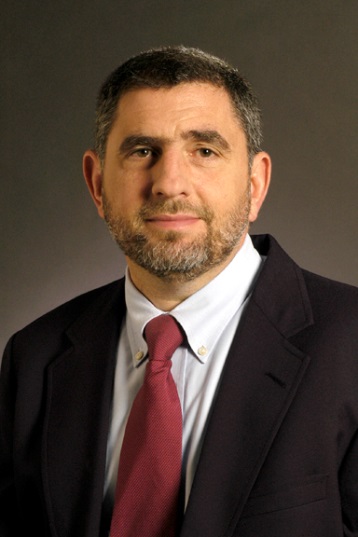
Advancing innovative intervention and treatment practices.
Dr. Kenneth Silverman is a researcher and Professor of Psychiatry and Behavioral Sciences at Johns Hopkins University’s School of Medicine and is Director of the Bayview Medical Center’s Center for Learning and Health. Dr. Silverman’s research concerns the Therapeutic Workplace, an employment-based intervention for behavior change. Through the Therapeutic Workplace, unemployed adults living in poverty earn the opportunity to work and earn wages by meeting treatment goals. Goals may include abstinence verified through drug monitoring, as well as adherence to Vivitrol (injectable naltrexone), a medication to prevent narcotic relapse. Pay is contingent on attendance, work speed, and accuracy. Workplace participants are trained in data entry skills using a web-based computerized program that automates teaching and accelerates learning. Enrollees also learn professional demeanor. Patient recovery is the priority of this program. If drug use occurs, every effort is made to keep the bond between employee and employer intact, so work can resume once abstinence is reestablished. Studies show incentives are among the most effective tools for initiating and sustaining abstinence, but they can be costly. Using wages from employment to pay for incentive interventions is a unique solution for treating people with chronic substance use disorders who may be at risk for relapse even after years of abstinence. In clinical trials, patients with long histories of unemployment and severe substance use disorders, including intravenous heroin and cocaine use, have been able to achieve long-term recovery through the Therapeutic Workplace.
Steve Talpins
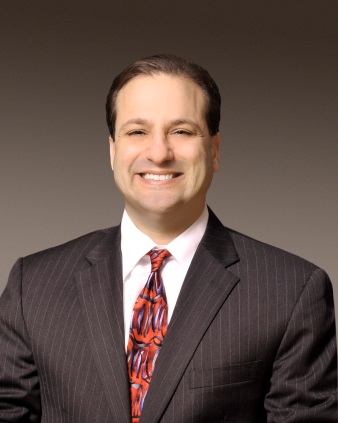
Identifying and promoting new strategies to reduce illegal drug use and its consequences.
Stephen K. Talpins, an attorney with Rumberger, Kirk & Caldwell, is Vice President of the Institute for Behavior and Health (IBH), a non-profit organization devoted to identifying and promoting new strategies to reduce illegal drug use and its consequences. IBH was founded and is led by Dr. Robert L. DuPont, the first Director of NIDA and the second White House drug policy advisor.
Mr. Talpins is an innovator and recognized authority on the full range of drugged driving issues. For more than 20 years he has worked collaboratively with public, private, and non-profit stakeholders on drugged driving. In 1994, Mr. Talpins argued and won a precedent setting Frye hearing on the admissibility of Drug Recognition Expert (DRE) testimony and evidence, including the horizontal gaze nystagmus test. Since that time, Stephen has consulted with prosecutors around the country on issues involving the DRE protocol and field sobriety tests. In 2010-2011, Mr. Talpins drafted a model per se drugged driving law for IBH. The model law was designed to be adapted to the needs of any state and provided the basis for a bill filed in the Florida legislature. In 2012, NHTSA asked Mr. Talpins to identify ways to incorporate drugged driving into the established Administrative License Review (ALR) system. Mr. Talpins drafted a model provision that was presented to the Board of Directors of the Governors Highway Safety Administration. The model ALR drug law was well-received and, in August 2013, the Governors Highway Safety Administration adopted a resolution encouraging states to study the efficacy of an ALR system for drugged drivers. Steve’s legal work and advocacy have served as important contributions to the national effort to prevent drugged driving and its public health and safety consequences.
Dr. Steven Loyd
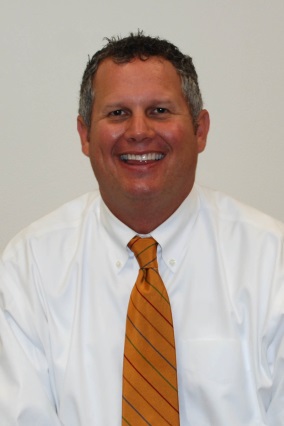
Preventing and addressing prescription drug abuse through prescriber education.
Dr. Steven Lloyd is making a difference in the national effort to prevent and address prescription drug abuse through prescriber education. Dr. Loyd is an Internal Medicine physician and medical educator in Tennessee with expertise in proper prescribing of controlled substances and substance use disorders. He is in recovery from his own prescription opioid and benzodiazepine disorder and now regularly lectures and educates health care professionals, law enforcement, policymakers, and others on the dangers of prescription narcotics. He is the Associate Chief of Staff of Education at the Mountain Home VA Medical Center, has considerable expertise in neonatal addiction issues/neonatal abstinence syndrome (NAS), and is a vocal advocate for public health/public safety cooperation. He is charismatic, plain-spoken, and has a sense of humor in his lectures and presentations. A quote from a November 2012 article about him: "Will addiction ever go away? No way. There'll always be something. The key is to treat the underlying problems. We're not going to get a handle on this until we get a multi-pronged approach and erase the stigma associated with addictive disease."
Learn more aboutHow Much Do Americans Really Spend on Drugs Each Year?
Posted by on March 7, 2014 at 5:29 PM ESTThe consequences of drug use in our communities are important to measure so that we can better understand both the scope of the problem and the scale of response required. Drug problems intersect with, and contribute to, many challenges our Nation faces.
Challenges like school failure, poverty, mental illness, criminal activity, and a wide array of health problems associated with substance use disorders. A new report we’re making available today provides some additional information that helps provide a clearer picture of the impact of drug use and its consequences on America.
According to this new study, drug users in the United States spent approximately $100 billion annually over the past decade on illicit drugs. This study updates several previous reports (beginning in 1995) which estimated drug trends back to 1988.
Notably, from 2000 to 2010, the amount people spent on cocaine dropped by half from $55 billion to $28 billion, reflecting dramatic decreases in the availability of cocaine after 2006: from approximately 300 pure metric tons in 2000 to about 150 pure metric tons in 2010.
The amount of money illicit drug use costs taxpayers, however, far exceeds the amount users spent on illicit drugs. In 2007 alone, illicit drug use cost taxpayers more than $193 billion in lost productivity, healthcare, and criminal justice costs.
Terry Zobeck is the Associate Director of Research and Data analysis at the Office of National Drug Control Policy.
Learn more aboutDirector Kerlikowske Confirmed by Senate as Commissioner of Customs and Border Protection
Posted by on March 6, 2014 at 4:17 PM ESTToday, the Senate voted to confirm Gil Kerlikowske to be the Commissioner of U.S. Customs and Border Protection, a role to which he will be transitioning over the next several days.
Once the transition is complete, Deputy Director Michael Botticelli will take on the role of Acting Director of National Drug Control Policy.
While the staff of the Office of National Drug Control Policy is sad to see Director Kerlikowske go, we wish him all the best in his new position, and we look forward to the continued leadership of Deputy Director Botticelli.
For more information about Deputy Director Botticelli, visit this page.
Learn more aboutThe President's FY 2015 Budget
Posted by on March 4, 2014 at 1:30 PM ESTThe President has released a budget that lays out a vision for how to create opportunity for all Americans, investing in items that will grow the economy, create jobs, increase skills training and improve education – all while continuing long term deficit reduction.
However, illegal drug use threatens the progress these opportunities will provide. In 2010, 100 people died every day from drug overdose, and the estimate in 2007 of the cost to the country of illicit drug use due to health care, crime, and lost productivity was $193 billion.
To address this burdening issue, the President’s National Drug Control Strategy represents a 21st century approach to drug policy that outlines innovative policies and programs and recognizes that substance use disorders are not just a criminal justice issue, but also a major public health concern. The Strategy lays out an evidence-based plan for real drug policy reform, spanning the spectrum of prevention, early intervention, treatment, recovery support, criminal justice reform, effective law enforcement, and international cooperation. In support of this Strategy, the President is requesting $25.4 billion in Fiscal Year 2015 to support a balanced approach that brings all sectors of society together in a national effort to improve public health and public safety.
This Administration has ensured that Federal funding to address the public health aspects of the issue has increased every year. It’s important to note that the portion of the budget spent on drug treatment and prevention efforts (43%) has grown to its highest level in over 12 years. Moreover, the $10.9 billion request for treatment and prevention is now nearly 20% higher than the $9.2 billion request for Federally-funded domestic drug law enforcement and incarceration.
A balanced, evidence-based approach working towards ensuring that the growing opportunity is not threatened.
Find more details on the President's drug control budget request here.
R. Gil Kerlikowske is the Director of National Drug Control Policy.
Learn more about5 Things to Know about Opioid Overdoses
Posted by on February 11, 2014 at 9:00 AM ESTThe abuse of opioids – a group of drugs that includes heroin and prescription painkillers – is having a devastating impact on public health and safety in communities across the Nation. With the amount of media attention focused on overdoses right now, it’s important to know the basics about the opioid overdose epidemic.
Here’s what we know:
- More Americans are using and dying from prescription painkillers than from heroin. According to the Centers for Disease Control and Prevention (CDC), we've seen roughly a 20 percent increase in overdose deaths involving prescription painkillers since 2006. In 2010, there were over 16,000 drug poisoning deaths involving prescription painkillers. There were about 3,000 drug poisoning deaths involving heroin that same year.[1]
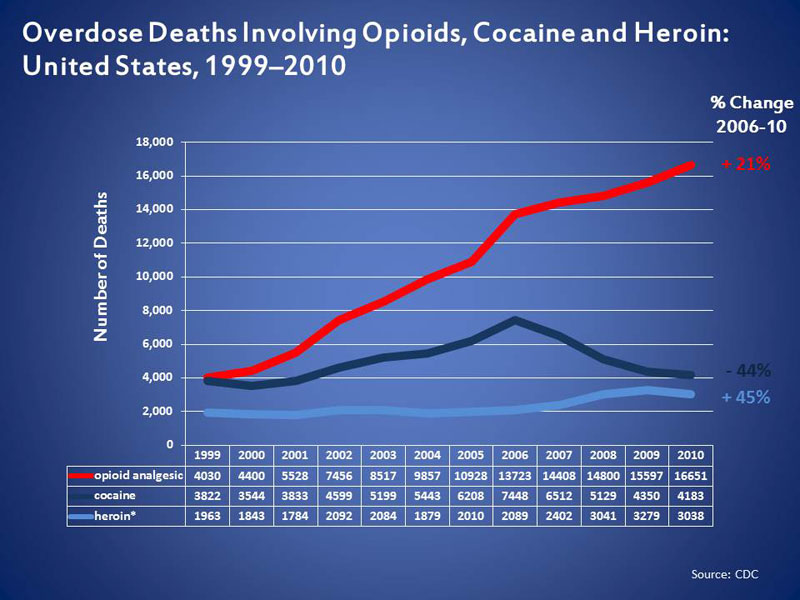
2. There is no such thing as a “good batch” of heroin versus a “tainted batch” of heroin. Any heroin use can lead to a fatal overdose. We're aware of current reports of fentanyl by coroners and medical examiners in Pennsylvania, Rhode Island, New Jersey, Maryland, and Michigan, and are monitoring this closely.
3. Heroin and prescription drug abuse are not limited to any certain demographic or geographic area. We see the negative consequences associated with opioid drug use in urban and suburban areas, rural communities, and inner cities alike. We have, however, seen indications that heroin use is increasing among young adults, which is a serious concern.
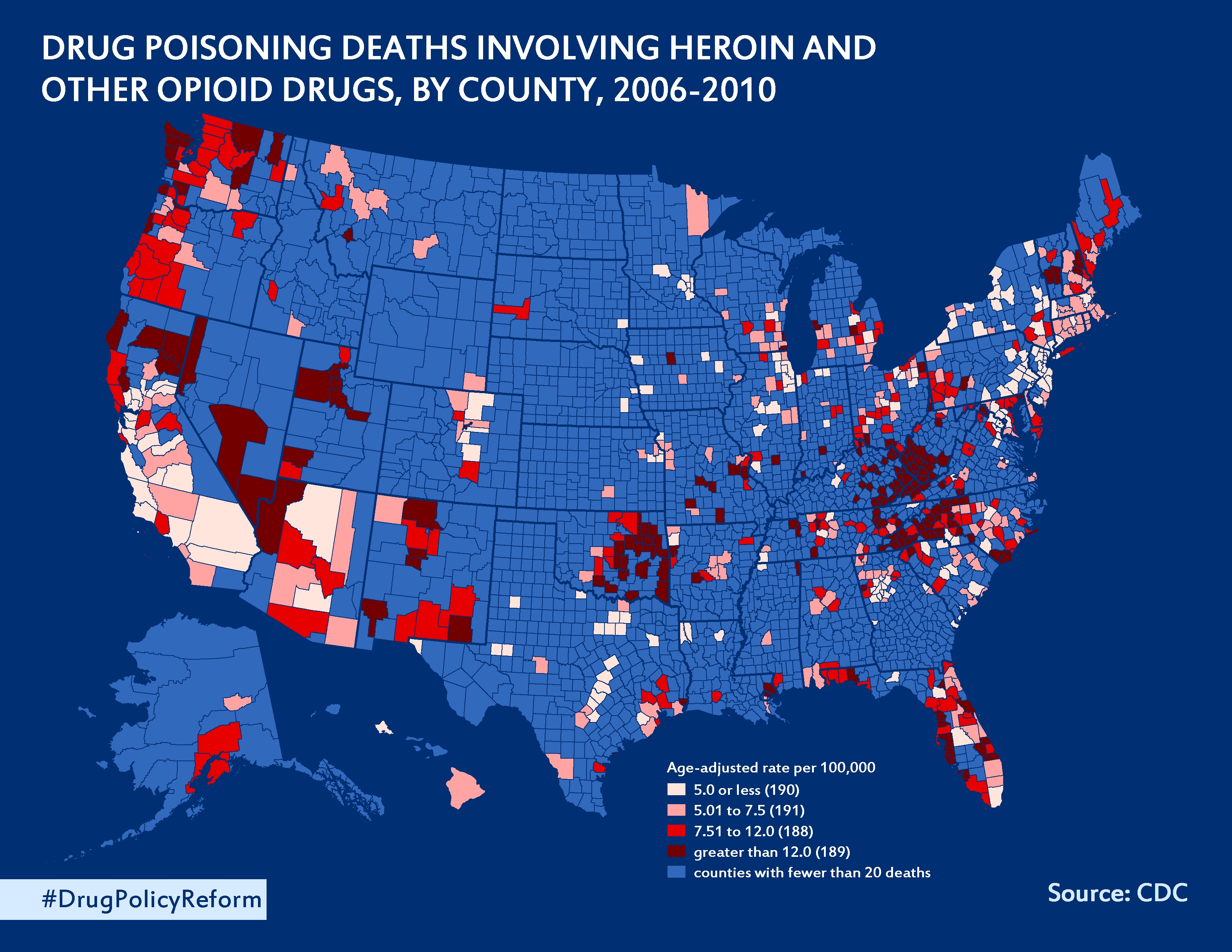
4. The vast majority of heroin in the United States comes from Colombia and Mexico, not Afghanistan, and we have not seen any evidence of a shift in this trend. According to DEA, the amount of heroin seized at the Southwest border increased 324 percent from 2008 to 2013.[2]

5. Every overdose is preventable. The Obama Administration is encouraging first responders to carry the overdose-reversal drug naloxone. When administered quickly and effectively, naloxone immediately restores breathing to a victim in the throes of an opioid overdose. Because police are often the first on the scene of an overdose, the Administration strongly encourages local law enforcement agencies to train and equip their personnel with this lifesaving drug. Seventeen states and the District of Columbia have amended their laws to increase access to naloxone, resulting in over 10,000 overdose reversals since 2001. We encourage everyone to learn more about naloxone. Used in concert with “Good Samaritan” laws, which grant immunity from criminal prosecution to those seeking medical help for someone experiencing an overdose, it can and will save lives. The map below shows which states have implemented Good Samaritan overdose laws and have taken action to increase access to naloxone:
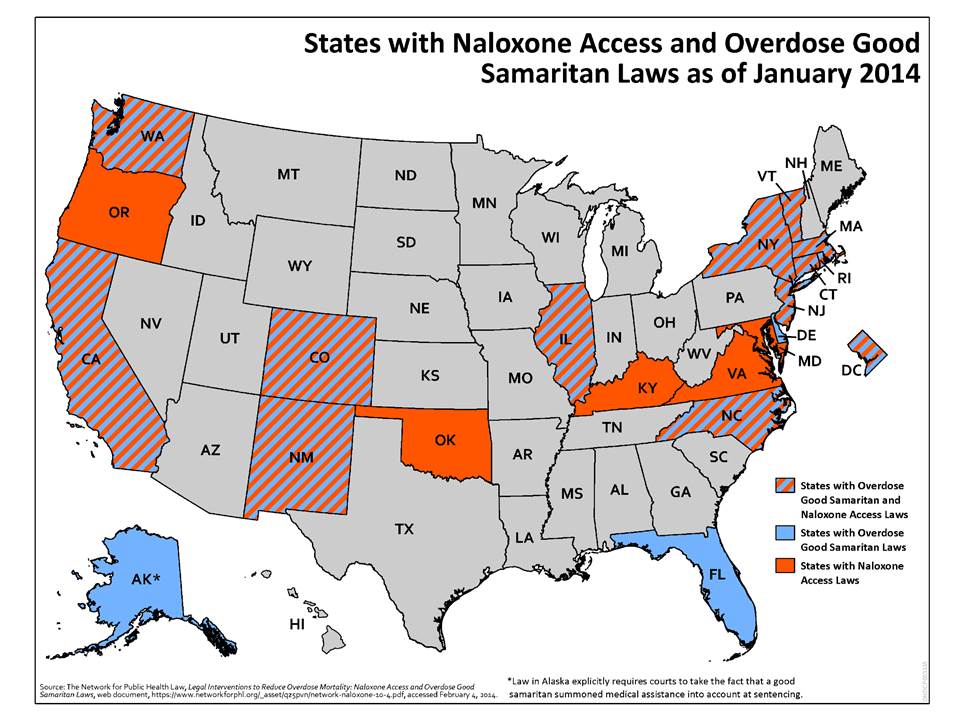
[1] CDC Wonder extracted February 4, 2014
[2] Unpublished data from DEA’s National Seizure System (NSS), El Paso Intelligence Center, 1/25/14.
Learn more aboutMacklemore Opens Up About Addiction, Recovery & Losing a Friend to Prescription Drug Overdose
Posted by on January 30, 2014 at 4:47 PM ESTIn his State of the Union address, President Obama said that here in America, our success should depend not on accident of birth, but the strength of our work ethic and the scope of our dreams. He reminded us that it is our citizens—entrepreneurs, farmers, veterans, doctors, fathers, mothers—who make the state of our union strong. He called for more jobs, a well-prepared workforce, and equal access to world-class education.
Yet for far too many Americans, opportunity is dimmed by addiction. Approximately 100 people die every day from drug overdoses across the country, and millions more struggle with substance use disorders. But in the coming months and years, the Affordable Care Act will expand access to substance use and mental health treatment to 62 million Americans, and the more than 20 million people in long-term recovery from addiction are proof that treatment works. Now, GRAMMY-award winning musician Macklemore has partnered with mtvU, the Jed Foundation and Clinton Health Matters to open up about his own struggle with addiction and his life in recovery to raise awareness among young people about the dangers of prescription drug abuse:
Learn more here & join our recovery community on Facebook.
Learn more about
- &lsaquo previous
- …
- 2
- 3
- 4
- 5
- 6
- 7
- 8
- 9
- 10
- …
- next &rsaquo
